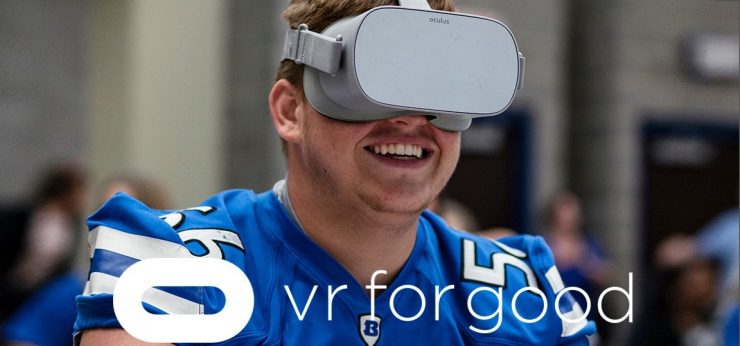Oculus Features CrashCourse Teasers on Concussion Awareness Day
Today is the third annual National Concussion Awareness Day – a day that reminds us all to take care of our brains and to support others who may be struggling with this invisible injury. On this special day, Oculus posted teasers of the CrashCourse VR materials on their Facebook and Instagram accounts. The Oculus posts and stories— captured by a special production team Oculus that flew to Little Rock— includes footage of high school athletes participating in the CrashCourse VR experience during the exclusive Arkansas product launch. Arkansas is the first state in the country to provide VR-based concussion education to every public high school in the state. This sneak peek of the VR materials was done in partnership with the Arkansas Department of Education, the Department of Health, the Arkansas Activities Association, and the EAST Initiative.
To commemorate this day, we’d also like to reiterate the importance of concussion education and reflect on our journey since launching our CrashCourse Football curriculum at the Stanford-USC football game last September. The product of two years of research and over a thousand individuals who gave their time to contribute, CrashCourse Football allows students to virtually experience what it feels like to sustain a concussion on the field, and provides them with the most up-to-date medical knowledge about concussions. Over the last year, we are humbled that CrashCourse has been covered in more than 100 news articles including The New York Times, Washington Post, and Forbes, as well as featured on NBC, CBS, FOX and ABC, among many others.
TeachAids announced a partnership with Pop Warner Little Scholars to distribute CrashCourse Football to youth across the nation. American Youth Football & Cheer also implemented CrashCourse, reaching over 500,000 young athletes. USA Football also made the CrashCourse curriculum available on their website, offering a certificate of achievement for any youth who complete the curriculum and answer a set of questions.
It’s not just football institutions who are pushing the boundaries of sports safety. USA Synchro also partnered with TeachAids to offer a certificate of completion to all youth athletes who complete the curriculum. In addition, the US Olympic Committee shared the CrashCourse concussion education with their coaches. They recently welcomed Dr. Piya Sorcar (TeachAids CEO) and Coach Dick Gould (TeachAids Vice Chairman) to present our TeachAids Methodology at the National Coaches Education Symposium. The photo above shows USOPC leadership watching the CrashCourse VR materials.
Lucile Packard Children’s Hospital has listed CrashCourse as one of their core Concussion Resources. We’ve also partnered with key concussion centers such as the Carolina Sports Concussion Clinic and Oregon Health & Science University Sports Concussion Program, and awareness organizations, including the Headway Foundation, Brain Trauma Foundation, and Concussion Alliance.
This work is fueled by advisors, ambassadors, and partners who have helped us to create CrashCourse and distribute it to youth across the nation. Researchers at the Stanford Neurosurgery Virtual Reality lab are providing guidance on our brain fly-through material, and while a team of physicians from the Stanford Concussion and Brain Performance Center advises on our concussion story wall project. In addition to the incredible team of experts who have lent their time and expertise to our CrashCourse initiative, we’ve bright students who are passionate about making their communities safer. For the seventh year, Dr. Piya Sorcar taught a class of Stanford students about global health interventions, with TeachAids as a case study. Many of these students went on to intern at TeachAids throughout the academic year and summer.
It is an honor and privilege to be working on such an important topic, and we are excited to continue increasing concussion safety amongst youth across the nation!
CrashCourse by TeachAids is currently being featured on the home page of Oculus’ new VR for Good website. See their article for more information!
